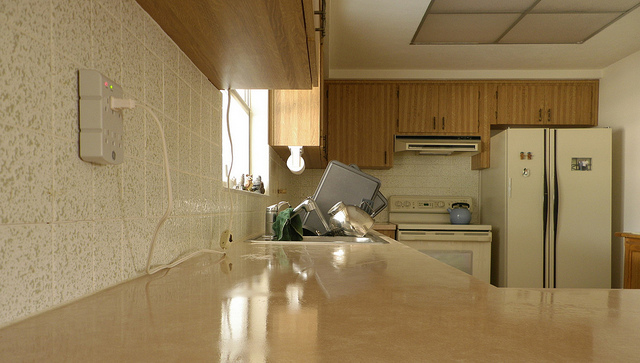Maintaining and Cleaning Granite Surfaces
Your new countertops are one of your home’s biggest investments and can transform the whole look and feel of your kitchen. Keeping your countertops clean and looking beautiful for years to come is surprisingly easy. We’ve compiled a list of items for you to reference in order for you to learn the ins and outs of cleaning granite countertops.
Basic Stone Care DO’S and DON’TS
Cleaning Stone Surfaces
Clean granite surfaces with a few drops of neutral cleaner, stone soap (available at hardware stores or from your stone dealer) or a mild liquid dish washing detergent and warm water. Use a clean rag or a soft cloth for best results. Too much cleaner or soap may leave a film and cause streaks. Do not use products that contain lemon, vinegar or other acids on your stone countertops. Rinse the surface thoroughly after washing with the soap solution and dry with a soft cloth. Change the rinse water frequently. Do not use scouring powders or creams; these products contain abrasives that may scratch the surface.
Spills and Stains
No matter how careful you are, spills are going to happen. A quick response and the right solutions can keep spills from damaging your stone or degrading the sealer.
Etch Marks
Highly acidic substances such as orange juice, coffee, vinegar, wine, tomato products, mustard and many soft drinks will “etch” most marble, limestone and travertine. Sealing allows you time to wipe up a spill, but it cannot stop the chemical reaction that may leave a dull mark.
General cleaners not specifically designed for natural stone are not recommended. These may etch away the polish, discolor the surface, scratch the stone or degrade the sealer. Professional refinishing is the best way to permanently remove etch marks and restore your natural stone’s even finish.
Food Spills
Scoop up the food with a plastic spoon. Blot with dry, white cloth. Spray the area with a neutral stone cleaner and wipe off excess with a clean cloth.
Liquid Spills
Blot away the excess with a clean, dry, white cloth while turning the cloth frequently. Spray the area with a neutral stone cleaner and wipe off excess with a clean cloth.
Mud
Let the mud stain dry completely. Remove dried mud with a soft plastic or nylon brush. Spray affected area with a neutral stone cleaner. Wipe dry with a clean cloth. If the stain remains, contact a professional cleaner.
Oily Stains
If you identify the stain as having an oil base (from foods like salad dressings, ketchup, cooking oils, butter or some cosmetics) you may be able to remove the stain using a poultice. A poultice will wick up the stain from deep within the stone.
Note: Above spill instructions are for reference purposes only. Please follow label directions on back of actual product.
Sources:
Natural Stone Care and Cleaning. (2012). In Marble Institute of America, Consumer Resouces. External Link http://www.marble-institute.com/consumers/care.cfm
Stone Care Essentials. (2012) In Dupont, Stone Care Essentials. External Link http://www2.dupont.com/Stone_Tech_Professional/en_US/Consumers/consumers.html

